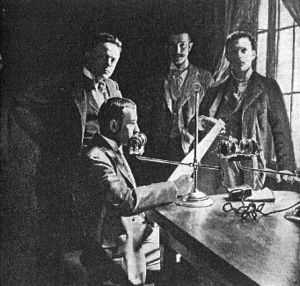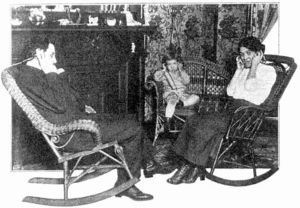Telephone newspaper
Telephone Newspaper is a general term describing telephone-based news and entertainment services, which were introduced beginning in the 1890s. These were the first systems of electronic broadcasting, and they offered a wide variety of programming, often for many hours each day. However, the technical limitations of this era meant there were limited means for amplifying and transmitting telephone signals over long distances, so their service areas were generally limited to a single city. Although these systems predated the invention of radio, beginning in the 1920s they were largely supplanted by radio broadcasting, due mainly to the ability of radio signals to cover much wider areas.
History
After the electric telephone was introduced in the mid-1870s, it was mostly used for personal communication, but the idea of distributing entertainment and news appeared soon thereafter, and many early demonstrations included the transmission of concerts. The Telephone Newspapers were financed on a subscription basis, including both monthly fees for home users, and through the use of coin-operated receivers, which provided short periods of listening for a set fee, in locations such as hotels. Some systems also accepted paid advertising. For their programming, the Telephone Newspapers initially drew from a mixture of outside sources, including local live theaters, in addition to programs transmitted from within their own studios. In later years, retransmitted radio programs were added.
Théâtrophone
The first organized telephone-based entertainment service appears to have been the Théâtrophone, which went into operation in Paris, France in 1890. This system drew most of it programming from the Paris theaters, but also included regular news summaries, each five minutes long.
Telefon Hirmondó
On February 15, 1893, the Telefon Hirmondó began operation in Budapest, Hungary. It would become the most prominent and longest-lived of the Telephone Newspaper systems, surviving in some fashion until 1944. The founder was inventor Tivadar Puskás, who died one month after the system went into operation. From the beginning the Telefon Hirmondó (which was generally translated into English as the "Telephone Herald") provided an extensive programming service. Its schedule in 1907 was as follows:
A. M.
9:00 -- . .Exact astronomical time.
9:30 --10:00. .Reading of programme of Vienna and foreign news and of chief contents
of the official press.
10:00--10:30. .Local exchange quotations.
10:30--11:00. .Chief contents of local daily press.
11:00--11:15. .General news and finance.
11:15--11:30. .Local, theatrical, and sporting news.
11:30--11:45. .Vienna exchange news.
11:45--12:00. .Parliamentary, provincial, and foreign news.
12:00 noon . .Exact astronomical time.
P. M.
12:00--12:30. .Latest general news, news, parliamentary, court, political, and military.
12:30-- 1:00. .Midday exchange quotations.
1:00 -- 2:00. .Repetition of the half-day's most interesting news.
2:00 -- 2:30. .Foreign telegrams and latest general news.
2:30 -- 3:00. .Parliamentary and local news.
3:00 -- 3:15. .Latest exchange reports.
3:15 -- 4:00. .Weather, parliamentary, legal, theatrical, fashion and sporting news.
4:00 -- 4:30. .Latest exchange reports and general news.
4:30 -- 6:30. .Regimental bands.
7:00 -- 8:15. .Opera.
8:15(or after the first act of the opera). . Exchange news from New York, Frankfort,
Paris, Berlin, London, and other business centers.
8:30 -- 9:30. .Opera.
The lack of amplification meant that the Telefon Hirmondó needed to employ strong voiced "stentors" to shout into double-cased telephones, so that the programs could be heard through-out the system. At its peak, the service had thousands of subscribers.
Electrophone
In 1895, the Electrophone went into operation in London, England. Most of its programming came from live performances in local theaters. On a few special occasions, it also shared programs with the Paris Théâtrophone. The Electrophone ceased operations in 1925. During the thity years that it operated, the service never had more than a few hundred subscribers.
Telephone Herald and Araldo Telefonico
The operators of the Telefon Hirmondó were interested in licencing their technology to other sites. At least two related operations were established. One was in the United States, where Telephone Herald in Newark, New Jersey (a suburb of New York City) began operation in 1911, but shut down due to economic problems the next year. A second location, for which there is little information, was the Araldo Telefonico in Rome, Italy.

